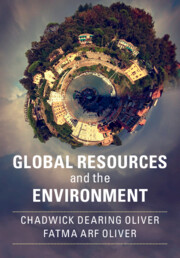Book contents
- Global Resources and the Environment
- Reviews
- Global Resources and the Environment
- Copyright page
- Dedication
- Contents
- Preface
- Acknowledgments
- Figure Credits
- Part I Introduction, Dynamic Systems, and Change
- 1 Introduction
- 2 A Perspective on Dynamic Systems
- 3 Change, Sustainability, and Related Concepts
- Part II People
- Part III Climates
- Part IV Landforms
- Part V Biodiversity
- Part VI Water
- Part VII Agriculture
- Part VIII Energy
- Part IX Minerals
- Part X Forests
- Part XI Perspective
- Book part
- Index
- Plate Section
- References
3 - Change, Sustainability, and Related Concepts
from Part I - Introduction, Dynamic Systems, and Change
Published online by Cambridge University Press: 05 July 2018
- Global Resources and the Environment
- Reviews
- Global Resources and the Environment
- Copyright page
- Dedication
- Contents
- Preface
- Acknowledgments
- Figure Credits
- Part I Introduction, Dynamic Systems, and Change
- 1 Introduction
- 2 A Perspective on Dynamic Systems
- 3 Change, Sustainability, and Related Concepts
- Part II People
- Part III Climates
- Part IV Landforms
- Part V Biodiversity
- Part VI Water
- Part VII Agriculture
- Part VIII Energy
- Part IX Minerals
- Part X Forests
- Part XI Perspective
- Book part
- Index
- Plate Section
- References
Summary
- Type
- Chapter
- Information
- Global Resources and the Environment , pp. 22 - 32Publisher: Cambridge University PressPrint publication year: 2018



